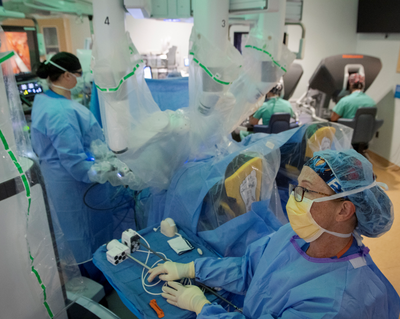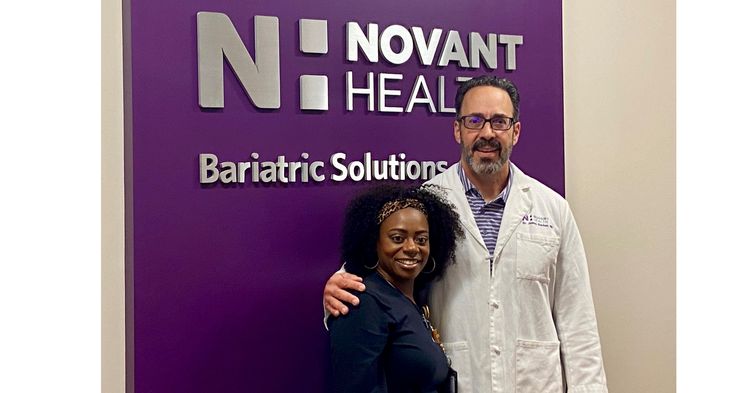Contrary to widespread belief, weight-loss surgery is not a quick way to effortlessly shed pounds. Having a gastric bypass or vertical sleeve procedure is not a fast fix.
Chris Bolo, clinic administrator for Novant Health Bariatric Solutions in Charlotte has a message for potential surgical candidates: An all-in commitment from them is needed. Here, she answers common questions about the procedure and talks about what to expect before and after surgery.
Helping you achieve a healthy lifestyle.
What’s the biggest misconception about weight-loss surgery?
That it’s the easy way. Many people think: You have surgery, you lose weight and that’s it. But there are big lifestyle changes patients have to make.
Because the drugs for diabetes – and now weight loss – are so effective and popular, why should someone consider surgery? Isn’t a weekly injection easier?
There are several reasons. One, GLP-1s are not always accessible. (That refers to glucagon-like peptide 1 agonists, which mimic the body’s natural GLP-1 hormone that signals to the brain when you’re full.)
You now have employers and insurance carriers saying they’re not going to cover them because of the price, which can run as high as $1,500 for a one-month supply. There are a lot of challenges involved in staying on these drugs long-term. If you go off a GLP-1, you’re going to regain weight if you’re not doing lifestyle management.
But at the same time, if a patient has surgery and doesn’t change their lifestyle, they can regain the weight as well.
What do you do to try to ensure your patients are successful?
Initially, our patients attend an online seminar to learn about the different types of surgeries and fully understand the lifestyle changes necessary for success.
If a patient is ready to commit after knowing all the requirements, we send them through a “bariatric surgical pathway.” Patients must have:
- Nutrition counseling.
- A behavioral health assessment and clearance.
- Exercise education.
- Metabolic testing.
- Body composition testing.
It’s important that surgical patients come back for follow-ups. We want to be sure they’re maintaining – and not gaining – or continuing to lose. Initially, you’ll lose a lot of weight immediately. And then six months to a year later, you might plateau a little bit. And that’s OK.
If we know about it, we can suggest changes – like switching up an exercise regimen or revisiting portion control. Or water intake. Forty ounces – eight glasses – is the minimum we want you to drink, and that’s a lot.

Top scores for safety in NC
Novant Health received the most ‘As’ for patient safety in North Carolina from The Leapfrog Group. With a focus on safety, quality and patient experience, the national, industry-leading nonprofit, evaluates and assigns letter grades ranging from A to F to hospitals across the country. Novant Health’s hospitals with “A” grades outperform 70% of hospitals nationwide for safety and quality.
Don’t you need to weigh a certain amount to qualify?
For insurance to cover the surgery, you should have a minimum BMI (body mass index) of 40. (Click here for a calculator.) In most cases, insurance will cover a BMI lower than 40 if the patient has one or more chronic diseases or conditions recognized by their insurance company.
With a BMI of 38 or 39, the one condition (or, comorbidity, in medical terms) that stands out – and is likely to warrant insurance approval – is severe, obstructive sleep apnea. All the chronic conditions – diabetes, hypertension, sleep apnea – start to resolve themselves with bariatric surgery.
We sometimes run into insurance carriers or employers who have an exception to obesity as a diagnosis for treatment. It would be wonderful if we could utilize the diagnosis of obesity, but usually it needs to be hypertension, sleep apnea, something like that.
We’ll work with the patient’s insurance company to verify benefits. Many insurance carriers have a bariatric benefit. However, some carriers have more stringent requirements, so it’s important to know those to determine a patient’s out-of-pocket costs.
How does family play a key role?
Patients will need more than the support of our team to be successful. If members of their family and/or support system — who may also be overweight — continue their same poor eating and lifestyle habits, that’s a challenge for patients. Support, over the course of a lifetime, is key for any bariatric patient.
What about the behavioral component? Why does that matter?
For binge eaters, emotional eaters and people with food addictions, it matters a lot. Many factors play a role in the causes of obesity. It is vital for patients to understand why they need medical intervention – and some of them are behavioral and chronic in nature. Just because a patient has bariatric surgery doesn’t make these causes go away. With resources from our behavioral health team, the patient can work through these causes.
Many of our patients come to us depressed and angry. It’s our job to make them feel comfortable, motivated, engaged and heard. We always tell them: “We’re here to help you, but we can’t do it without you.”
Patients should understand the changes that are going to happen – mentally, emotionally, physically. A behavioral health assessment can help determine if a patient has some type of disordered eating or even suicidal ideation.
If they do, it doesn't mean they’re not going to be able to have surgery at all. It does mean we need to hit pause and get them into a specialist to be assessed. We have a wonderful tracking system that helps us keep up with and check in with patients on a sort of pause. The last thing we want is for somebody who’s been diagnosed with an eating disorder to be part of a weight-loss program.
If you’re not mentally in a place to make such a big lifestyle change, we need to know that. For patients who don’t feel ready for surgery, we’ll work with them on a non-surgical program.
Can you tell who’s going to be a successful with their weight loss journey?
Compliance and engagement are key. Is the patient coming to all their appointments? Are they keeping a food journal?
You offer a lot of support before surgery. What about after surgery?
After an initial 12-week follow-up, patients are scheduled for six- and 12-month post-surgical visits. We want to see post-surgical patients once a year for the rest of their life. We also offer monthly support groups at all of our locations, as well as workshops to assist patients at every stage of their weight-loss journey.
What if a patient can’t make lifestyle changes needed for surgery?
If surgery isn’t right for someone, we discuss nonsurgical options. Surgery is just a small piece of this lifelong journey to optimum health and wellness.

What, if anything, has changed about bariatric surgery at Novant Health Bariatric Solutions – Elizabeth in the past five or six years?
Our operation is much bigger now than even five years ago. We really have a footprint all around Charlotte. We have a large, center city location and a new and much bigger location in Huntersville. We have a Matthews location. We have a full, five-days-a-week Ballantyne location. And we’ll soon add a Steele Creek clinic.
In 2018, we did a little over 600 surgeries. Last year, we did just shy of 900 surgeries using the vertical gastric sleeve.
Novant Health also offers bariatric surgery in its Winston-Salem and coastal regions.
Another recent innovation is remote patient monitoring (RPM), which might accompany bariatric surgery or be used as a standalone tool. Bariatric RPM care allows a patient to rely on their clinical team as an accountability partner. The patient does the work, but they’re connected, via an app, to their care team and are in contact daily.
One patient was using remote patient monitoring as he prepared for surgery – and ended up not needing it. And that’s amazing.
Telehealth visits became imperative during COVID, and we continue to use those. For the bariatric patient, there are so many touch points. And we’re trying to meet patients where they are, because we know that it can be stressful having the number of appointments you need in order to qualify for surgery. Making some of them online is a huge time-saver.













